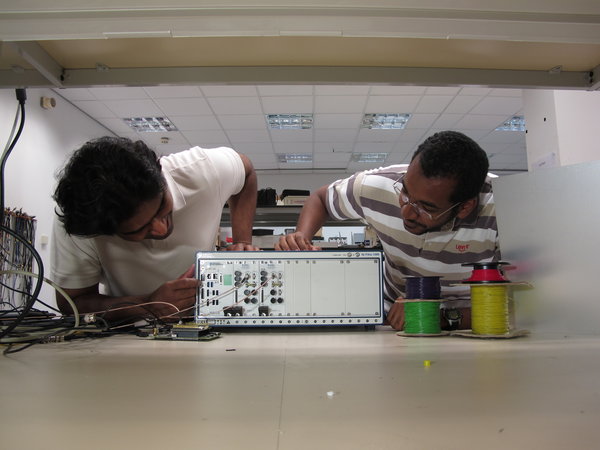FARAD: Frequency Agile RADio
Project team
Principal investigator:
Co-investigators:
- Dr Kevin Morris
- Dr Paul Warr
Postdoc assistants:
- Dr Chris Gamlath
- Dr Eyad Arabi
| Research area | Connectivity |
|---|---|
| Dates | 1st April 2015 - 31st December 2018 |
| Funder | EPSRC |
| Contact person | Professor Mark Beach |
Frequency Agile RADio (FARAD) project is a 3-year research intense activity in partnership with the University of Sheffield funded by EPSRC addressing highly linear frequency agile transceiver solutions which are both energy efficient and cost effective solutions for 5G and beyond wireless connectivity. Industrial partners include NEC, Thales, Fujitsu, Orange, Chemring, Harada, u-blox and Cascoda.

The overarching aim of FARAD is to undertake cutting edge research to provide a step change in the capabilities of radio frequency (RF) communication transceivers. Specifically, the research will enable small, integrated radio units to flexibly access multiple radio bands simultaneously over a frequency range from 450MHz to 6GHz. The continuing, growing demand for wireless access to internet applications and services is causing an exponential increase in data traffic through wireless networks. This has led to a feared capacity crunch. This challenge is being met through the development of small cell, heterogeneous wireless access networks supported by the simultaneous use of multiple frequency bands. However, the realisation of concurrently operating multiband radios in a device presents a major implementation challenge and could inhibit the adoption of techniques such as Software Defined Networks (SDN), where frequency agility of the wireless bearers is highly desirable. Therefore, the main objectives of FARAD are:
- The integrated co-design of RF sub-systems where radio components are coordinated to provide tuneable operation at multiple frequencies whilst also enhancing spectral and energy efficiency;
- Novel baseband processing and signal waveforms which enable the effective use of tuneable multiband radios whilst accommodating interference;
- The verification of the proposed solutions via targeted demonstrations using hardware-in-the-loop testbed evaluation of key configurations commensurate with relevant usage scenarios.
The project will embrace the co-design of antennas, amplifiers, filters and digitisers to achieve spectrum and energy efficient frequency agile radio systems. The project consists of five major research tasks:
- Tuneable Antennas and Filters - Research will focus on reconfigurable and tuneable antennas with integrated filters to achieve frequency selectivity and concurrent multiband operation.
- Transmit Amplifiers - Research on transmit amplifiers for base stations and handsets will focus on methods to achieve retuneable, linear, wideband, power efficient and concurrent multiband operation.
- Receiver Interference Mitigation - Simple and efficient solutions to reduce the effects of unwanted signal suppression caused by RF blockers in the multiband RF receiver chain will be sought.
- Multiband A/D Conversion & PAPR Reduction - Research will focus on developing concurrent multiband ADC techniques at the receiver and the design of signal sets with significantly reduced peak-to-average-power ratio (PAPR).
- Testbed Demonstration: Tasks 1-4 will lead to the evaluation and demonstration of solutions using a hardware-in-the loop RF testbed.